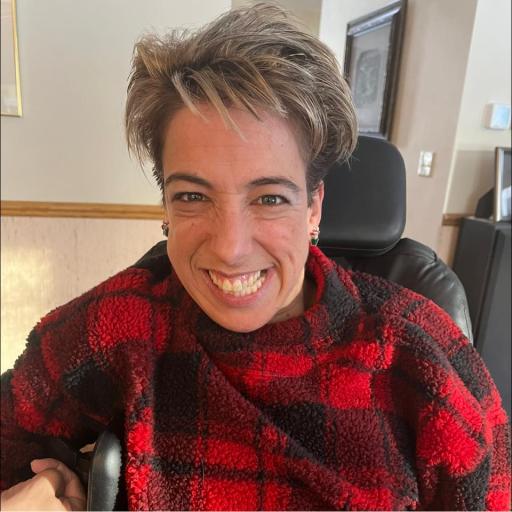
Stacy's Journal: Just Who are Them?
“Sticks and stones may break my bones, but words will never hurt me.” Many people hear that saying in life. Is it true? Absolutely not. Words hurt. In today’s world, I wonder what would happen if words caused physical harm. I think we would have even more problems than we already do. Unfortunately, discrimination is part of life in the world we live in. I believe everyone gets discriminated against at some point in life—it’s just a fact. Obviously, there are lots of different types of discrimination. People with disabilities often feel more discriminated against than the average person.
“I used to take care of them,” a lady recently said to my parents while we were sitting by the pool in Florida. I was taken back by her comment. Them? Am I really a them? I know the lady likely didn’t mean to say it in a negative way, but it came off as if I was a part of some cult or something. I’m not a “them” just because I have some limitations. My mom went into her “Mama Bear” mode right away and started explaining all I’ve accomplished. This is a frequent occurrence when people make inappropriate comments or ask awkward questions about me. My parents don’t put up with rude people. When the lady left, I asked my mom, “am I really a them?” She and dad then went into their spiel about ignorant people. We’ve had this discussion a million times, but it doesn’t get old—it helps me realize that many people just don’t understand disabilities. In a way, talking about it with my friends and family (who obviously understand) helps me cope with the negativity.
I’ve written entries in the past about how people treat people with disabilities. People can be extremely rude. I’d like to think that they don’t realize they’re being hurtful when they say things, but sometimes, it’s hard to believe that. Thankfully, I was too young to remember this, but, when I was a kid and still in a stroller, a lady came up to my mom in a department store and asked her why she didn’t just let me die. Seriously? Who says that? I don’t even know how my mom responded, but I bet she said something to the effect that “I’m sorry you feel that way and I’m sorry Stacy heard you ask me that. We are extremely grateful that we have her.” My mom still brings it up every once in a while, so I know it hurt her.
As I get older, I find myself wondering if it will ever stop. Will my nephew have to respond to those inappropriate comments about me? How will he react? I know my sister, brother-in-law, parents, and I will try to help him understand that people will stare, point, and say things because I’m different. My hope is that he will understand and became another one of the people who help me advocate and respond.
As I’ve said before, kids are totally different. When they point, stare, and say things, they do it out of curiosity. They are trying to learn about differences. When I see a little kid pointing and asking questions or saying something, the adult with them often pulls her/him away and tries to hush the child. I don’t like this. Depending who I’m with at the time, I often try to interact with the kid. It’s so important to educate kids and let them ask the questions, so as they get older, they know how to interact with people who are different than them.
I believe people with disabilities also have to make a conscious effort to educate people. We can’t expect people not to react negatively if they don’t know how to appropriately interact with us. Of course, in a perfect world, people should not interact with people with disabilities any differently, but we know that this world is far from perfect. As a person with a disability, I feel I have a responsibility to educate people who don’t understand or know how to treat people with disabilities.
In today’s day in age, disability discrimination has been put on the back burner. With everything going on in the world, I believe there are many other pressing issues to tackle at the moment. That’s not to say that disability discrimination/equality isn’t important. It’s just the media has many more pressing issues to cover. I’ve only discussed verbal discrimination in this entry, but there are many other types of discrimination that people with disabilities face. Housing, financial, and employment discrimination are also very prevalent in the disability community.
Will there ever be a day when the pronoun “them” will be just associated with a group of friends and that’s the only meaning? Unfortunately, I don’t see that day coming anytime soon. It’d be a very boring world if everyone was exact same. We have to continue to make an effort to be vigilant and sensitive to differences. I challenge each of you to reach out to someone who is different than you this week. Take five minutes to talk to him/her and learn something about them. You never know—it could result in a lifetime friendship!
***The views expressed here are strictly those of the author and do not necessarily reflect those of InControl Wisconsin, the Network or any of our sponsors.
